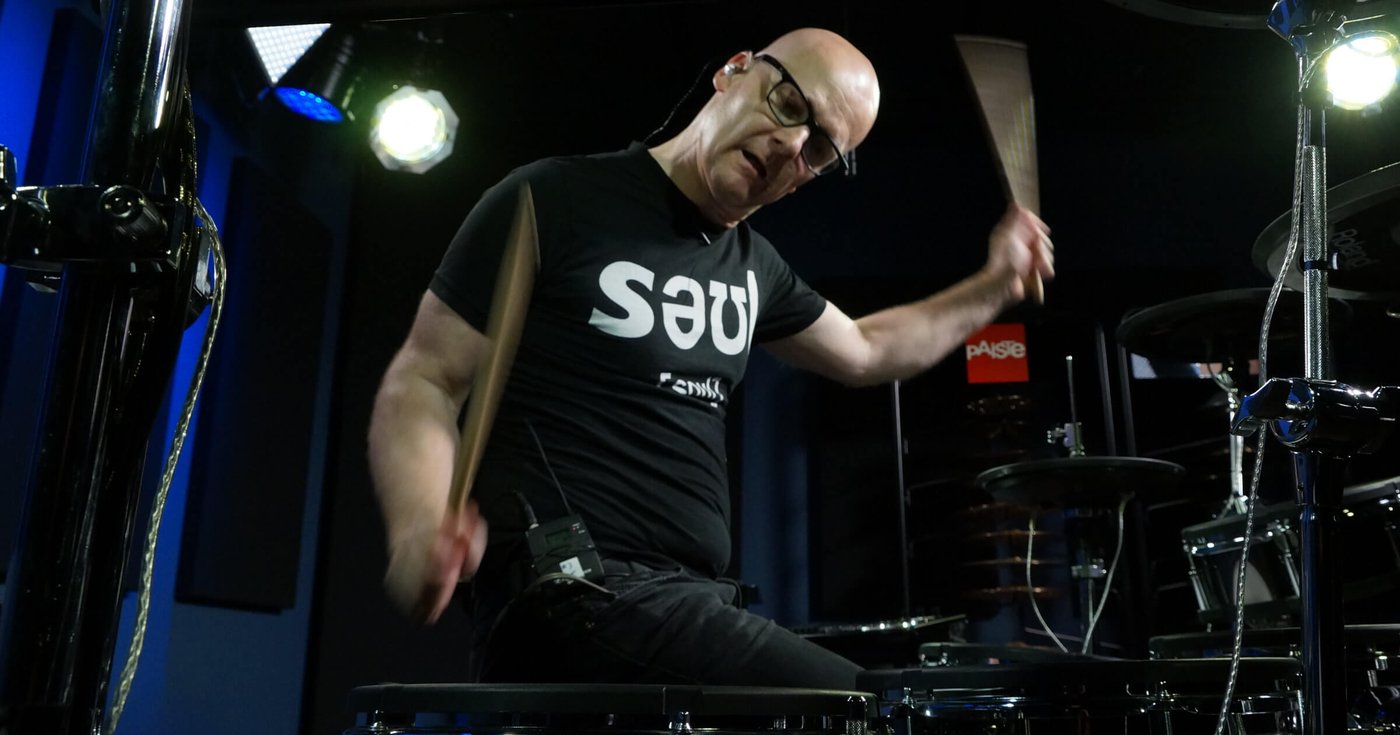
Do you need to fix your soundcheck?
Drummers are notorious for taking the longest to get ready on stage. If you want to throw that stereotype out the window and surprise your fellow musicians and sound engineers, here’s how to optimize your soundcheck so it’s quick, efficient, helpful, and stress-free:
Before you do anything else, introduce yourself to the sound engineer. Think of them as your partner in crime. Learn what mics they’re using and make sure you’re on the same page.
Once the drums are set up, remember to bring a drum key, sticks, and gaffer tape to your soundcheck. The sound engineer will be at the mixing desk or control room arranging the patching and checking microphone levels, so you should make sure that you have everything in hand when you get onstage. The engineer will appreciate it if you’re well-organized; it makes everyone’s job much easier!
Make sure you’re happy with how the drums sound. Check the toms, adjusting the tuning if necessary. Keep moon gels or drum tacs on hand, just in case.
Take care of your own monitoring if possible. Before you start playing, lightly tap on each microphone with your fingers to make sure it’s on. Everything should work and be connected before you go into the actual soundcheck. Communicate with the engineer if something seems off – you’ll save time and you might even surprise them by being proactive.
It’s time to soundcheck. If the engineer says “kick drum”, only play the kick drum. Don’t go into any fast playing or into a double bass run. Aim for a medium tempo so the engineer can check on resonance and make sure the mic isn’t distorting. This also gives you time to get accustomed to the acoustics: how the kick drum reacts to its surroundings, and how it sounds in your monitors.
Bass drums are peculiar. In a live situation, they can be the most difficult to soundcheck. Low end drum sounds consume the most energy in a concert setting. This is why you should keep that kick drum going when you check the snare. Suggest this to the engineer. If they’re into the session, they’ll appreciate that you care about how the kick sound behaves with the snare on top. If the engineer says “stop”, stop immediately. If they say nothing, keep playing.
Next, add the hi-hat over the kick and snare. This is the ultimate test of the sound system because you have the low end (kick), lower mid range (kick and lower frequencies of snare), mid range (snare), and high range (hi-hat). Keep going with a very simple beat, and open the hi-hat every once in a while.
Next, to score major points with the sound engineer, bring in the cymbals. Be sure not to hit two crashes simultaneously – the engineer can check the panning if you play one at a time.
If you aren’t happy with something the engineer is doing, make polite suggestions. Don’t yell out that something is wrong or make frustrated demands; they might be busy doing something else you can’t see, like changing compressor settings or checking distortion on one of the cables. Let them do their thing, and just make friendly suggestions when you think something should be different.
Next, check the toms. Many drummers make the mistake of shredding with fast fills during soundcheck. How will the engineer be able to figure out which sound is coming from where? Slowly hit each tom on its own, and make sure you aim right in the middle to get the full sound. If you’ve been asked to only play the rack tom first, do it. When they say “next”, go to the next tom, and so on.
If you think soundcheck is taking too long, you can ask politely if you should switch to another tom, or you can eventually start adding in the next drum, going back and forth between the two. Stay friendly. Work together with the engineer. “Hey – are you okay with this? Ready for the floor tom?”
Next, play the full drum set. But again, don’t just shred around the drums. Go back to a simple mid-tempo beat, incorporating all pieces of the kit including cymbals and toms. This will also give your body a little warm-up.
If other musicians are starting to make noise before your soundcheck is done, let the engineer take the initiative to ask them to stop. If you start getting angry, it can add tension onstage when you need to play together later. Of course, you can help the engineer ask the other musicians if they can please wait two minutes for you to wrap up.
The drummer can make a big difference in how smooth soundcheck goes. Introduce yourself to the engineer, come prepared, and communicate. Listen and follow the engineer’s routine so they have time to adapt your drum sound to the PA system. You’re working together. There should be no yelling and no competition – only synergy. Do this and you’ll be fine for the rest of the day!
Michael Schack does it all: massive festival stages, European dance clubs, and concert venues around the world. More than a performer, he’s a clinician and teacher who knows how to translate his insights into practical results you can use.


By signing up you’ll also receive our ongoing free lessons and special offers. Don’t worry, we value your privacy and you can unsubscribe at any time.
We use cookies for traffic data and advertising. Cookie Policy »